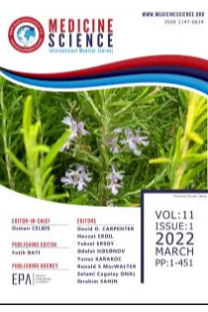Assessment of awareness, knowledge levels and consumer perception of students of health high school towards functional foods
___
Kandıralı Ş. Özel bir sağlikli beslenme ve diyet danişmanliği’na başvuran danişanlarin fonksiyonel besinlere yönelik farkindaliği, Bilgi Düzeyleri ve Tüketim Sıklıklarının Araştırılması, Başkent Üniversitesi Sağlık Bilimleri Enstitüsü, Yüksek Lisans Tezi, Ankara, 2014;112s.Yabancı N, Şimşek I. Üniversite öğrencilerinin probiyotik ürün tüketim durumlari, TSK Koruyucu Hekimlik Bülteni, 2007;6(6)449-54.
Sevilmiş G. Bazı fonksiyonel gidalarda tüketici kararlari ve bunlari etkileyen faktörlerin belirlenmesi üzerine bir araştirma, Ege Üniversitesi Fen Bilimleri Enstitüsü,Yüksek Lisans Tezi, İzmir, 2008.
Mitsuoka T. Development of Functional Foods, Biosci Microbiota, Health. 2014;33(3):117-28.
Kopuz HE. İstanbul ilinde tüketicilerin çeşitli fonksiyonel gida ürünlerine olan yaklaşimlari, Namık Kemal Üniversitesi Fen Bilimleri Enstitüsü, Yüksek Lisans Tezi, Tekirdağ, 2011.
Dayısoylu KS. Fonksiyonel gida güvenliği, Türkiye 10. Gıda Kongresi; 2123 Mayıs, Erzurum, 2008.
Özçiçek Dölekoğlu C, Şahin A, Giray FH. Kadınlarda fonksiyonel gida tüketimini etkileyen faktörler: akdeniz illeri örneği, Tarım Bilimleri Dergisi, 2015;21:572-84.
Alaşalvar C, Pelvan E. Günümüzün ve geleceğin gıdaları fonksiyonel gıdalar, Bilim ve Teknik 2009; Ağustos.
Dayısoylu KS, Gezginç Y, Cingöz A. Fonksiyonel gida mı, Fonksiyonel bileşen mi? Gıdalarda fonksiyonellik, Gıda, 2014;39(1):57-62.
Coşkun T. Fonksiyonel besinlerin sağliğimiz üzerine etkileri, Çocuk Sağlığı ve Hastalıkları Dergisi, 2005;48:69-84.
Karaağaç S, Tüketicilerin fonksiyonel gidalari kullanmaya ve ödemeye razi olduğu miktari etkileyen faktörler: Antalya ili örneği, Gaziosmanpaşa Üniversitesi Sosyal Bilimler Enstitüsü, Yüksek Lisans Tezi,Tokat, 2010.
Uygun Ü, Fonksiyonel gidalar ve gida üretiminde yenilikler, tüketici yazilari (I), Hacettepe Üniversitesi Hastaneleri Basımevi, Ankara.2007;213-20.
Özkan Özdemir P, Fettahlıoğlu S, Topoyan M, Fonksiyonel gida ürünlerine yönelik tüketici tutumlarini belirleme üzerine bir araştirma, Ege Akademik Bakış, 2009;9(4):1070-100.
Özen AE, Bibiloni Mdel M, Pons A, Tur JA. Consumption of functional foods in Europe; a systematic review, Nutr Hosp. 2014;29(3):470-8
Lee ES, A flood of health functional foods: what is to be recommended?, J Menopausal Med. 2015;21(1):12-8.
Hacıoğlu, G, Kurt G. Tüketicilerin fonksiyonel gıdalara yönelik farkındalığı, kabulü ve tutumları: İzmir ili örneği. Business and Economics Research Journal, 2012;3(1):161-71.
Barcellos, MD, Lionello RL. Consumer market for functional foods in South Brazil. International Journal on Food System Dynamics, 2011;2(2):126-44.
- ISSN: 2147-0634
- Yayın Aralığı: 4
- Başlangıç: 2012
- Yayıncı: Effect Publishing Agency ( EPA )
Efficacy of high dose steroid treatment in pulmonary hemosiderosis
Gökçe PINAR REİS, AYŞENUR BAHADIR, Erol ERDUMAN
Prevalence of benign, precancerous and malignant skin tumors in the elderly population in Mugla
Asude KARA POLAT, EMİNE TUĞBA ALATAŞ, Aslı AKIN BELLİ, GÜRSOY DOĞAN, METİN PIÇAKÇIEFE
FADİME ÜSTÜNER TOP, Ayşe Ferda OCAKCI
Ekim SAĞLAM GÜRMEN, Mücahit AVCİL, Bekir DAĞLI, KIVANÇ KARAMAN
Yalçın GÖKOĞLAN, Erkan YILDIRIM
Saurabh RamBihariLal SHRIVASTAVA, Prateek Saurabh SHRİVASTAVA, Jegadeesh RAMASAMY
Opinions of nurses working in NICU about family centered care
DİLEK KÜÇÜK ALEMDAR, FUNDA KARDAŞ ÖZDEMİR, SEVİNÇ POLAT
Effect of neurodynamic mobilization on pain and function in subjects with lumbo-sacral radiculopathy
Srishti Sanat SHARMA, Megha SANDEEP SHETH
AHMET SELİM ÖZKAN, Sedat AKBAŞ, NİHAT POLAT
Emre KUBAT, Celal Selcuk UNAL, Aydin KESKİN, Emre GÖK, Ufuk Turan Kürşat KORKMAZ, Ümit KERVAN, Mustafa PAÇ, Kasım KARAPINAR
